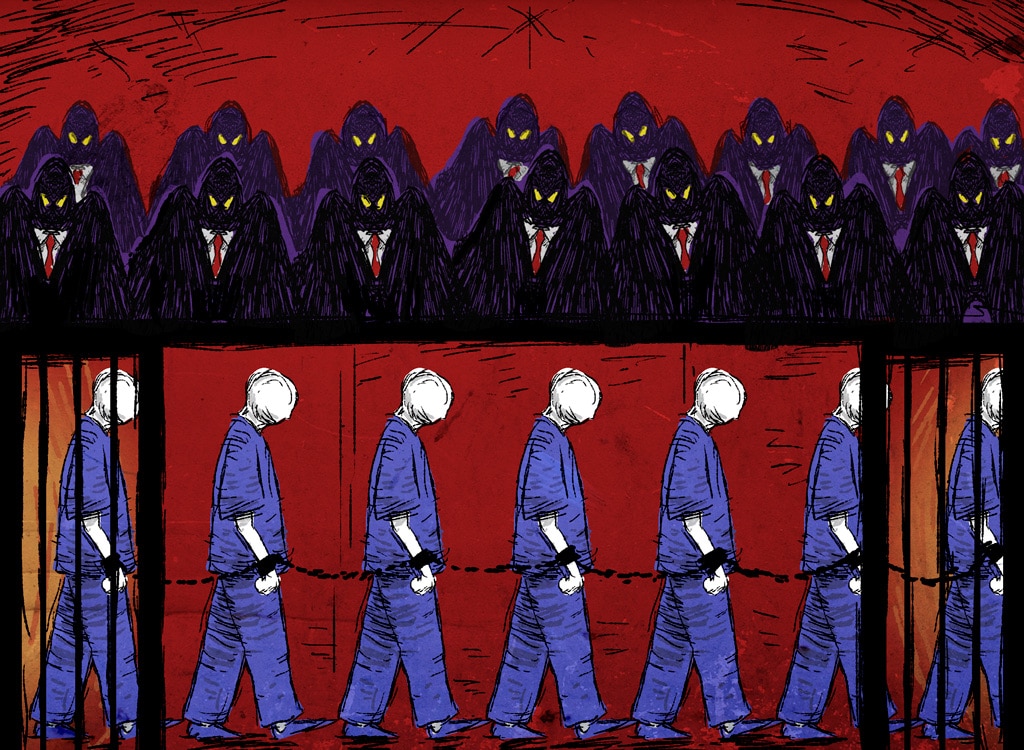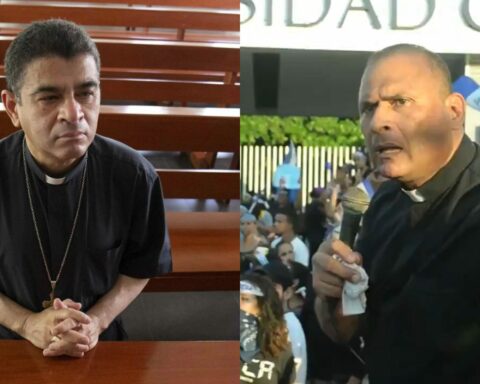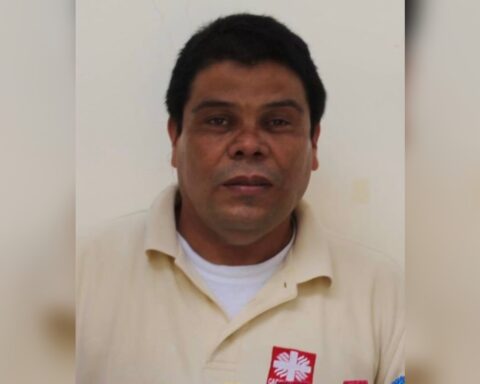The executors of the political orders emanating from El Carmen to convict the political prisoners of Nicaragua are a select group of 15 judges and prosecutors loyal to the ruling Sandinista Front, who are cruel to prisoners of conscience that Daniel Ortega himself branded as “criminals.” ” and “sons of bitches of imperialism” in November 2021.
Judge Luden Martín Quiroz García, of the Ninth Criminal District Court of Managua, imposed on February 7 a sentence of ten years in prison for the alleged crime of “undermining national integrity” on Ana Margarita Vijil, leader of the Union Renovating Democratic Party (Unite).
Vijil was arrested in June 2021 in the midst of the repressive escalation with which the regime eliminated electoral competition, arresting more than 40 people, including opposition leaders, academics, peasants, students, businessmen and journalists. To carry out these arrests, he used repressive laws created at the end of 2020, including one that persecutes alleged “fake news” and another that punishes “treason against the country.”
After Vijil’s sentence, Quiroz declared guilty on February 8 the sports writer Miguel Mendoza, known not only for his performance as a professional, but also for his critical opinions of the Ortega regime.
Judge Quiroz, however, was unknown among criminal lawyers familiar with the justice system. Two months before Ortega’s virulent speech, he was holding a position with less public attention in the civil area. He was a judge for the execution of embargoes from which he was brought to public light when one was executed against the Nicavision Channel 12 television station.
The owner of that channel, Mariano Valle, then described the objection filed by the General Directorate of Revenue as illegal, and observed in it an instrument with which the regime was trying to take away the television station.
Six judges in charge of securing convictions
Martín Quiroz is one of the six judges who are now in charge of sentencing prisoners of conscience. The others are Nadia Camila Tardencilla Rodríguez, of the Second Court of the Criminal Trial District; Angel Jancarlos Fernandez Gonzalez, of the Fourth Court; Félix Ernesto Salmerón Moreno, of the Fifth Criminal Trial District; Nancy Aguirre Gudiel, of the Tenth Court, and Ulisa Yahoska Tapia Silva, of the Thirteenth Court.
Judicial sources indicated that Tardencilla Rodríguez was appointed to the position in February 2021, after assuming the vacancy when the justice system controlled by the FSLN promoted Adela Cardoza to Appeals magistrate, precisely because of her prominent role as executioner of political prisoners from the April 2018 Rebellion.
Nadia Tardencilla is the daughter of former deputy Orlando Tardencilla, a former guerrilla fighter in the 1980s in El Salvador and Nicaraguan ambassador to the United Nations Organization in Switzerland, recently proposed as part of a short list to hold the position of secretary general of the Central American Integration System. (SICA), which was rejected by the regional body.
Judge Ángel Jeancarlos Fernández is part of the network of graduates of the Redemptoris Mater Catholic University (UNICA), founded by the late Cardinal Miguel Obando y Bravo, and directed by the family of former magistrate Roberto Rivas —ally of the regime and former president of the Supreme Council Electoral-. In April 2018, days before the opposition protests broke out, his university congratulated him on his Facebook account for his performance as the first local criminal judge in Managua.
Félix Salmerón graduated with a law degree from the National Autonomous University of Nicaragua, in León, in 2007, with a monograph on how “exempt the criminal accusation”. Before holding this position, he was a substitute third district judge, specialized in violence in Managua and was also in the position of head of the processing of secretaries of the courts specialized in violence. In addition, he had experience as head of the office of local criminal processing of the capital courts.
Judge Nancy Aguirre has been in office since October 20, 2010, according to a brief note published in the Official website of the Judiciary. Since 2018, he has also stood out convicting political prisoners.
In January 2021, Aguirre found guilty two Nicaraguans who were exiled and were caught returning to the country by the Nicaraguan Army on the border with Costa Rica, accusing them of murder, organized crime and drug trafficking, crimes rejected by their defense attorneys. Julio Montenegro and Yonarqui Martinez. However, the Prosecutor’s Office requested 92 years in prison for them. Aguirre sentenced in February 2021 the political prisoners, Danny García and William Caldera, originally from Masaya.
Judge Yahoska Tapia also sentenced the leader of Unamos, Suyen Barahona, on February 7. She is originally from Masaya, and was the head of the single local court of Ticuantepe. In 2014, she was a candidate for secretary of the board of directors of the Association of Judges and Magistrates of Nicaragua (AJUMANIC) in the group headed by former judge Julio César Arias, recognized in the past for his role as a repressor of political prisoners.
The Prosecutor’s Office rotates its files according to the stage of the process
On the side of the Prosecutor’s Office, which plays the role of accusing the victims of Ortega’s repression, the members of the Public Ministry rotate their teams, depending on the procedural stage in which they are. The main prosecutors are: Perla de los Ángeles Baca, Martha Ileana Morales, Jean Dylan Rivas FalconJorge Luis Arias Jarquín, Marling de Jesús Castro Rodríguez, Andrea del Carmen Salas, Yubelka Pérez Alvarado, Carlos Rafael Espinoza Castilla and Manuel de Jesús Rugama, among others.
“They live by changing. Because one thing is the name of the person who appears registered filing the accusation, another is the person who arrives between hearings. She is never the same person, ”said three defense attorneys consulted by CONFIDENTIAL.
In recent years, the Prosecutor’s Office has also experienced changes in its personnel, especially as of 2018, when a part resigned or was fired to make an institution tailored to the interests of the FSLN, represented by Attorney General Ana Julia Guido, explained sources of the institution. With these new members, who reached 90% of the entire prosecutorial apparatus, they guaranteed compliance with party orders, regardless of the bulk violation of Nicaraguan laws.
The representative of the Prosecutor’s Office ordered the student leader and political prisoner, Lesther Alemán, to be silenced on February 3, for example, when he was found guilty, and asked the judge not to give him the floor, despite having the right.
To impose on its prosecutors, the regime also does not take into account professional preparation. Two sources linked to the Prosecutor’s Office confirmed that the prosecutor Martha Ileana Morales was director of the Department of Planning and Statistics of the Public Ministry and she does not have notable experience from the procedural point of view. “She is more of a desk prosecutor,” they said.
Prosecutor Perla de los Ángeles Baca is originally from Nagarote, she worked as an assistant prosecutor in Jinotega, also as a regular prosecutor in Chinandega and was subordinate to prosecutor Manuel de Jesús Rugama, who in turn stood out in the persecution of journalists in the case. against the Violeta Barrios de Chamorro Foundation and before that he was a police officer, linked to the structures of the FSLN.
The fate of prosecutor Marling de Jesús Castro Rodríguez has been tied to attorney general Ana Julia Guido, whose assistant she has been since she was deputy of the institution. Meanwhile, the prosecutor Andrea del Carmen Salas is the one who filed the accusation against the political prisoner Miguel Mora, owner of 100% Noticias, sentenced to 13 years in prison.
The sources consulted by CONFIDENTIAL They refer that Yubelka Pérez Alvarado —the last of this list of prosecutors— was a member of the Sandinista Youth, was in the area of the Unit for Crimes against Gender Violence, and in 2021 she went to the Specialized Unit against Organized Crime, the elite group formed to fabricate political cases under the command of prosecutor Javier Morazán.
“All of these officials are loyal to the FSLN,” says a source familiar with the work of the Public Ministry. As another example, he cites the case of prosecutor Carlos Rafael Espinoza Castilla, originally from Chontales, former prosecutor of Jinotega and who as of 2019 began to enthusiastically persecute political prisoners, earning himself a reputation.
“The trial is for a person who committed a crime and neither Miguel (Mora) nor the rest of the political prisoners have committed any crime. What I expect is the immediate release of him. We have placed our trust in God and that the Lord will do justice,” said Verónica Chávez, wife of the former presidential candidate and owner of the confiscated 100% Noticias.
A report by the Inter-American Commission on Human Rights (IACHR), published in October 2020, indicated that, since the beginning of the demonstrations, “arbitrary arrests and deprivation of liberty They have been used with the main intention of repressing any position of opposition to the current regime and transmitting a message of fear and control to the Nicaraguan population.”
To achieve this, a mechanism of repression deployed by the Police has been key, in order to besiege precise objectives in their homes, and prevent any opposition demonstrationalong with the campaign of repression sustained by the justice system, in which judges and prosecutors participate to concretize the convictions of critics of the regime.








